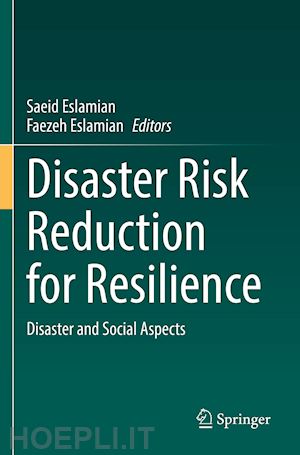
Questo prodotto usufruisce delle SPEDIZIONI GRATIS
selezionando l'opzione Corriere Veloce in fase di ordine.
Pagabile anche con Carta della cultura giovani e del merito, 18App Bonus Cultura e Carta del Docente
This book is part of a six-volume series on Disaster Risk Reduction and Resilience. The series aims to fill in gaps in theory and practice in the Sendai Framework and provides additional resources, methodologies, and communication strategies to enhance the plan for action and targets proposed by the Sendai Framework. The series will appeal to a broad range of researchers, academics, students, policy makers, and practitioners in engineering, environmental science, geography, geoscience, emergency management, finance, community adaptation, atmospheric science and information technology.
This volume provides a holistic approach to developing disaster risk reduction strategies and policies, exploring the most effective ways to integrate physical and social science aspects of hazard resilience to better inform local populations. This risk-based approach to community resilience development is used to craft a collaborative system for crisis management, and allows for the implementation of nationally determined contributions (NDCs) through social innovation and community engagement to enhance community emergency response support and preparedness. Readers will also learn about education of disaster risk reduction, human health risk assessment, gendered perspectives in disaster response, recovery, and disaster management legislation.
Chapter 1. Resilience Assessment at the State Level using the Sendai Framework.- Chapter 2. Disaster Recovery Reform and Resilience.- Chapter 3. Recovery, Development Programs and Place-Based Reconstruction Policy: A Flexible Framework.- Chapter 4. Recovery, Development Programs and Place-Based Reconstruction Policy: The Instrumental Role of Insurance.- Chapter 5. Development of Multi-Hazard Early Warning System in India.- Chapter 6. Cultural and Religious Aspects of Resilience: The Case of Typhoon Ketsana Victims in the Philippines.- Chapter 7. Building Socio-Ecological Resilience by Design for Flood-Prone Waterfront Cities: A Comparative Study of New Orleans of USA, Brisbane of Australia and Christchurch of New Zealand.- Chapter 8. Building Socio-Ecological Resilience against Drought: Case Study from Bhachau, Kachchh, Gujarat.- Chapter 9. Building Socio-Hydrological Resilience for Inclusion-Experience of Co-Operatives in Tanzania.- Chapter 10. Strengthening Climate Resilience andDisaster Risk Reduction: Case Study of the Sahel Adaptive Social Protection.- Chapter 11. Effect of Climate Change on Water Availability and Quality: An Assessment of Socio Resilience in Nigeria.- Chapter 12. A Risk Based Approach to Development Planning.- Chapter 13. Flood Risk Instruction Measures: Adaptation from the School.- Chapter 14. Flood Resilient Cities.- Chapter 15. Coastal Flood Prone Communities and Sustainability.- Chapter 16. Disaster Risk Reduction: Detecting Himalayan Glacial Lake Outburst Floods.- Chapter 17. Communities, Organizations and Partnerships for Climate Change Mitigation and Disaster Reduction.- Chapter 18. Coastal Wetland Hydrologic Resilience To Climatic Disturbances: Concept, Quantification, and Threshold Response.- Chapter 19. Perception of Vulnerable Ultra-Poor Women on Climate Change Impacts and Local Adaptation in a High Flood Prone Area of Bangladesh.- Chapter 20. Climate Change Adaptation and Resilience on Small-Scale Farmers
Dr. Saeid Eslamian is a Full Professor of Hydrology and Water Resources Sustainability at Isfahan University of Technology in the Department of Water Engineering. His research focuses mainly on statistical and environmental hydrology and climate change. In particular, he is working on modeling natural hazards including flood, drought, storm, wind, and pollution toward a sustainable environment. Formerly, he was a Visiting Professor at Princeton University, University of ETH Zurich, and McGill University. He has contributed to more than 1K publications in journals, books, and technical reports. He is the Founder and Chief Editor of the International Journal of Hydrology Science and Technology. Eslamian is now associate editor of six important publications: Journal of Hydrology (Elsevier), Eco-Hydrology and Hydrobiology (Elsevier), Water Reuse (IWA) and Journal of the Saudi Society of Agricultural Sciences (Elsevier), Arabian Journal of Geosciences (Springer), International Journal ofClimate Change Strategies and Management (Emerlad)
Professor Eslamian is the editor and author of approximately 25 Handbooks. The editorship of Eleven handbooks published by Taylor & Francis (CRC Press): the three-volume Handbook of Engineering Hydrology in 2014, Urban Water Reuse Handbook in 2016, Underground Aqueducts Handbook (2017), the three-volume Handbook of Drought and Water Scarcity (2017), Constructed Wetlands: Hydraulic Design (2020) and Handbook of Irrigation System Selection for Semi-Arid Regions (2020). The two-volume Handbook of Water Harvesting and Conservation by Wiley and two books entitled Evaluation of Groundwater Storage Potentials in a Semiarid Climate and Advances in Hydrogeochemistry Research by Nova Science Publishers (USA) are also his book publications in 2019, 2020, and 2021 respectively.











Il sito utilizza cookie ed altri strumenti di tracciamento che raccolgono informazioni dal dispositivo dell’utente. Oltre ai cookie tecnici ed analitici aggregati, strettamente necessari per il funzionamento di questo sito web, previo consenso dell’utente possono essere installati cookie di profilazione e marketing e cookie dei social media. Cliccando su “Accetto tutti i cookie” saranno attivate tutte le categorie di cookie. Per accettare solo deterninate categorie di cookie, cliccare invece su “Impostazioni cookie”. Chiudendo il banner o continuando a navigare saranno installati solo cookie tecnici. Per maggiori dettagli, consultare la Cookie Policy.